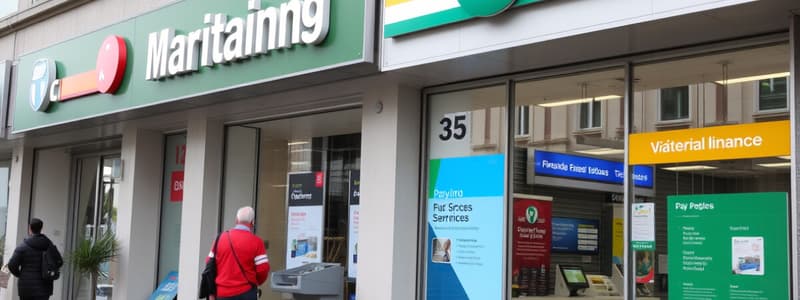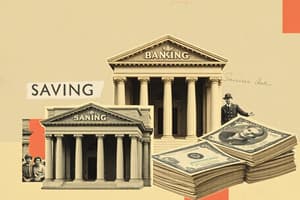Podcast
Questions and Answers
What are the three main categories of services offered by financial institutions?
What are the three main categories of services offered by financial institutions?
savings, payment services, and borrowing
What are the three aspects that are under savings services?
What are the three aspects that are under savings services?
savings accounts, certificates of deposit, and money market accounts
What are three aspects under the payment services?
What are three aspects under the payment services?
checking accounts, online bill pay, and payment of real estate taxes
What are five aspects under the borrowing services?
What are five aspects under the borrowing services?
What are a few other financial services?
What are a few other financial services?
What types of electronic banking services are available?
What types of electronic banking services are available?
What are four types of financial institutions?
What are four types of financial institutions?
What is a commercial bank?
What is a commercial bank?
What is a savings and loan association?
What is a savings and loan association?
What is a mutual savings bank?
What is a mutual savings bank?
What is a credit union?
What is a credit union?
What are non-deposit type institutions?
What are non-deposit type institutions?
What is a life insurance company?
What is a life insurance company?
What is an investment company?
What is an investment company?
What is a finance company?
What is a finance company?
What is a mortgage company?
What is a mortgage company?
What are the positives of using cash?
What are the positives of using cash?
What are the negatives of using cash?
What are the negatives of using cash?
What are the positives of using checks?
What are the positives of using checks?
What are the negatives of using checks?
What are the negatives of using checks?
What are the positives of using store-valued cards?
What are the positives of using store-valued cards?
What are the negatives of using store-valued cards?
What are the negatives of using store-valued cards?
What are the positives of using a debit card?
What are the positives of using a debit card?
What are the negatives of using a debit card?
What are the negatives of using a debit card?
What are the positives of using a credit card?
What are the positives of using a credit card?
Flashcards are hidden until you start studying
Study Notes
Financial Institutions Services
- Three main categories: savings, payment services, and borrowing.
Savings Services
- Key aspects include savings accounts, certificates of deposit (CDs), and money market accounts.
Payment Services
- Primary components consist of checking accounts, online bill pay, and real estate tax payments.
Borrowing Services
- Major aspects encompass car loans, mortgages, student loans, personal loans, and credit cards.
Other Financial Services
- Include retirement investing, Individual Retirement Accounts (IRAs), mutual funds, and currency conversion.
Electronic Banking Services
- Consist of direct deposit, ATMs, debit cards, and automatic payments.
Types of Financial Institutions
- Four primary types: commercial banks, savings and loan associations, mutual savings banks, and credit unions.
Commercial Bank
- An institution that accepts deposits, offers business loans, and provides related financial services.
Savings and Loan Association
- A locally managed institution that utilizes individual deposits to provide long-term home loans or personal loans.
Mutual Savings Bank
- A chartered financial institution owned by members contributing to a common fund, without capital stock.
Credit Union
- A member-owned financial cooperative operated for the purpose of offering financial services to its members.
Non-Deposit Institutions
- Include life insurance companies, investment companies, finance companies, and mortgage companies.
Life Insurance Company
- Provides financial support or money to beneficiaries in the event of an individual's unexpected death.
Investment Company
- Sells shares to individuals and invests primarily in the securities of other companies.
Finance Company
- Focuses on providing loans and credit to consumers and businesses.
Mortgage Company
- Loans money to customers for buying homes, borrowing from banks, and sells the loans to investors.
Positives of Cash
- Most liquid form of money, prevents debt accumulation, and does not require a bank.
Negatives of Cash
- Vulnerable to theft, minimal interest earnings, and not suitable for large purchases.
Positives of Checks
- Helps track finances, facilitates large payments, and provides payment proof.
Negatives of Checks
- May expose personal information, can be bounced, and requires proper completion for transfer.
Positives of Store-Valued Cards
- Usable like cash anywhere, unlinkable to personal accounts, reducing theft risk.
Negatives of Store-Valued Cards
- High fees, elevated interest rates, and funds cannot be replaced if lost.
Positives of Debit Cards
- Functions like cash, reduces chances of debt, and incurs no interest charges on purchases.
Negatives of Debit Cards
- Subject to overdraft fees, may not be accepted by all retailers, and tied to checking account balances.
Positives of Credit Cards
- Safer alternative to cash, offers easy replacement if lost or stolen.
Studying That Suits You
Use AI to generate personalized quizzes and flashcards to suit your learning preferences.




